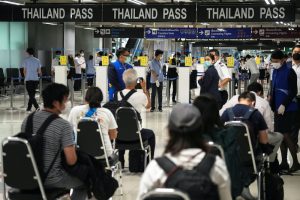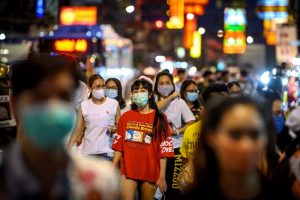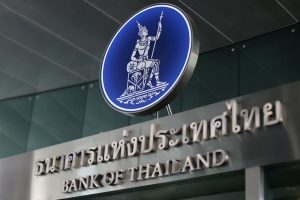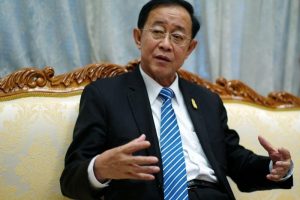Growing concern about the Omicron Covid variant has led authorities in Bangkok to suspend their quarantine-free Thailand Pass entry programme – but the government said on Wednesday about 200,000 travellers already approved to fly into Bangkok and Phuket this week would be allowed to enter.
Officials said visitors would be able to travel the country if their first Covid-19 test (RT-PCR) came back negative.
But they would have to adhere to some basic requests – stay in hotels overnight till the test result is known, download the MorChana app on their phones so their movements can be tracked (if necessary), and undergo a free, second Covid-19 test on day 5 or 6 after arrival, or earlier if they develop any symptoms, the Bangkok Post reported.
The visitors should be well received, as the Thai economy has taken a battering over the past two years, with millions of people thrown out of work and the government forced to unveil several huge relief packages.
Nearly two thirds of Thai citizens (63%) have had two doses of an anti-Covid vaccine and the government is working to bolster that number as quickly as it can.
BOT Keeps Rate at Record Low
Meanwhile, the baht held steady near a two-week low on Wednesday after Thailand’s central bank kept its interest rate unchanged as expected.
The Thai currency barely moved after the Bank of Thailand held its key interest rate at a record low to bolster the tourism-reliant economy.
While the bank’s monetary policy committee “assessed that the Thai economy would continue to recover,” it also warned that the spread of the Omicron variant of the coronavirus would be a key risk to the economic outlook and warranted close monitoring.
“The setback to the tourism sector caused by the spread of Omicron means rates are likely to remain at their current all-time low for some considerable time,” Gareth Leather, senior Asia economist at Capital Economics, said.
Earlier in the session, the currency eased as much as 0.4% to 33.80 per dollar, its weakest since December 7. Analysts at Citi do not expect a rate hike before 2023 on limited inflationary pressures.
The Thai economy contracted by 0.3% year-on-year in the third quarter with private consumption declining by 3.2% in the context of the Delta wave.
“The baht has been one of Asia’s weakest currencies this year as the longstanding current account surplus has turned into a deficit with tourist arrivals having remained until recently close to zero,” Chris Wood, global head of equities at Jefferies, said.
Tourist Plan Rejigged
The Omicron variant, which was first reported in Thailand on December 6, has forced officials to put the quarantine-free Thailand Pass entry programme – a significant move toward reopening the country – on hold.
Officials said that from midnight on Wednesday, no new applications for quarantine exemptions under the Thailand Pass scheme would be considered.
The government said this was a temporary suspension rather than a permanent ban, but it gave no date for when the doors would be opened again.
Tourism is one of Thailand’s biggest industries, with the country having seen nearly 40 million visitors in 2019 – and very few since then.
Thai police were searching the island of Koh Samui for an Israeli tourist who left his Bangkok hotel without waiting for his Covid-19 test result, which later was revealed to be positive. However, the man turned himself in to police on the island on Wednesday afternoon.
• George Russell and Jim Pollard with Reuters
READ MORE:
Omicron’s Spread Causes More Lockdowns, Delayed Reopenings
Thailand Plots Sustainable Comeback for Phi Phi: Straits Times
Bank of Thailand Moves to Ease Debtors’ Woes
Thailand, Australia Welcome Arrivals As Border Curbs Ease
























